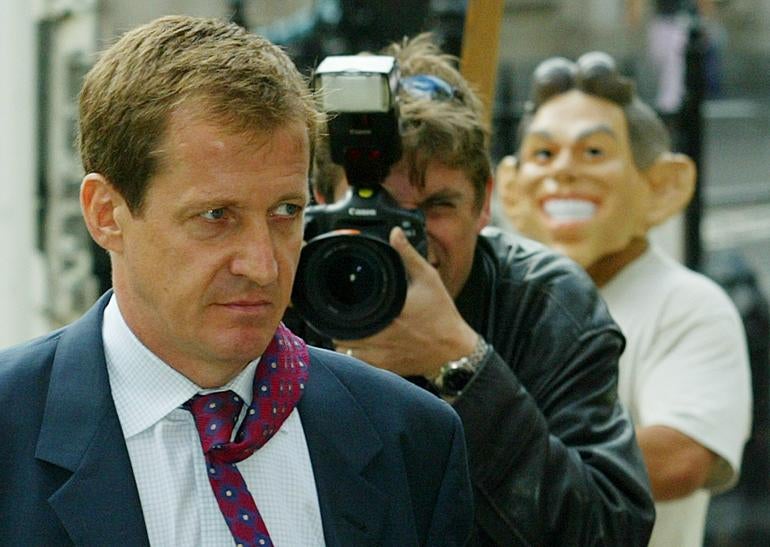
Political blogger Paul Staines, who runs the order-order website under the name Guido Fawkes, has been summoned to appear before the Leveson Inquiry into press standards after evidence from former Number 10 communications chief Alastair Campbell was leaked online.
Campbell submitted papers containing a string of potentially damaging claims to lawyers ahead of his appearance before Lord Justice Leveson next week.
But a link to the 16-page document last night appeared on the order-order website.
Writing on his blog, Staines highlighted contentious elements in Campbell's evidence and claims to have obtained the papers legally.
A statement issued by the Leveson Inquiry read: "Lord Justice Leveson was extremely concerned to hear that, on November 27 2011, a copy of the evidence that Mr Alastair Campbell intended to provide to the inquiry was published on the 'Guido Fawkes' website.
"The website asserts that this statement was obtained by 'legal means' but Lord Justice Leveson will be enquiring further into this claim and Mr Paul Staines will be required to give evidence."
Campbell, a former Daily Mirror journalist and spin doctor to Tony Blair, said he was "genuinely shocked" to see his evidence in the public domain.
His statement will now be published on the inquiry website on Monday, rather than on Wednesday following his appearance as would be the norm.
Raising questions over practices at the Daily Mirror, Campbell said he believed a story about Cherie Blair's pregnancy printed by the tabloid in 1999 could have been obtained by phone hacking.
While he admits to having "no evidence" to suggest the voicemails of either Mrs Blair or her husband's lifestyle consultant Carole Caplin, were intercepted, he queried the origins of a number of articles about the then premier's wife.
"I do not know if her (Caplin's) phone was hacked, or if Cherie's was, but knowing what we do now about hacking and the extent of it, I think it is at least possible this is how the stories got out," he states.
"They often involved details of where Cherie was going, the kind of thing routinely discussed on phones when planning visits, private as well as public.
"I have also never understood how the Daily Mirror learned of Cherie's pregnancy. As I recall it, at the time only a tiny number of people in Downing Street knew that she was pregnant.
"I have heard all sorts of stories as to how the information got out, but none of them strike me as credible."
Campbell, whose evidence contains a damning indictment of press antics, said he became suspicious his own phone may have been targeted following a meeting with former Labour culture secretary Tessa Jowell at his home.
When they arrived for the rendez-vous, which had been arranged over the phone, a photographer was waiting outside.
In his wide-ranging depiction of the media today, Campbell describes a culture where journalistic standards have been "eroded", speed is more important than accuracy and stories get published "regardless of the truth".
"Sometimes, stories become so big, in the eyes of large parts of the media, that an 'anything goes' mood sets in," he writes.
He claimed figures who find themselves in the public eye can end up subject to "coverage which at times can only be described as inhumane".
A "culture of denigration" and "desperation to get the story at all costs" leads someone working for a newspaper to "think it permissible to hack the phones of celebrities," he concludes, adding: "Once that moral and legal limit has been breached, it leads the same person to think nothing of hacking Milly Dowler's phone too."
Meanwhile, he claims stories such as the disappearance of Madeleine McCann, whose parents gave moving evidence to the Leveson Inquiry last week, resulted in media "hysteria" which took the press "at times in the opposite direction to the pursuit for truth".
After the three-year-old went missing in Portugal in 2007, her face was splashed across countless newspapers as part of a massive campaign to locate her.
"The word 'Madeleine' became a seller, almost at times on a par with Diana in the heyday of the Princess of Wales, and any story, no matter how cruel, no matter how insubstantial or unchecked out, would go on the front, regardless of the pain it might cause, regardless of its veracity," Campbell states.
The former spin doctor, who is credited as one of the key architects of the highly-disciplined media strategy which helped bring about Labour's landslide general election victory in 1997, expressed astonishment after his evidence appeared on the internet this afternoon.
In a post on microblogging site Twitter, he wrote: "Genuinely shocked someone has seen fit to leak my statement to Leveson. Less surprised that Guido Fawkes headline misrepresents it."
Staines had on Saturday alerted readers of his blog to yesterday's.
Under the heading: "Contra Leveson", he wrote: "Tomorrow, Guido will demonstrate the freedom of the press, in the internet age, empirically. Contra Leveson…."
A spokesman for Trinity Mirror, publisher of the Daily Mirror and more than 160 regional newspapers, said the company stood by an earlier statement which read: "All our journalists work within the criminal law and the Press Complaints Commission's code of conduct."
Email pged@pressgazette.co.uk to point out mistakes, provide story tips or send in a letter for publication on our "Letters Page" blog

